How Long Can You Survive without Food and Water: A few Factors That Influence Survivability
How long can you survive without food and water? It’s a question that you will want to ask just so you know how to adjust your plan of action if ever you find yourself in an emergency.
[the_ad_group id=”21″]
The answer isn’t as straightforward as what you may be led to believe. But, before going into detail, let’s talk about the significance of food and water to human function.
Why Is Water Important?
Water is a key element in sustaining life. Aside from the Earth’s atmospheric composition and its precise distance from the sun, water is largely responsible for the life-sustaining environment of Earth. Water is found in every living creature on the planet, from the tiniest micro-organism to the largest living creature.
On a cellular level, water serves as a mean for transportation of various substances throughout a cell’s internal structure and the environment. In fact, NASA’s main criterion in the search for life in outer space is the presence of water.
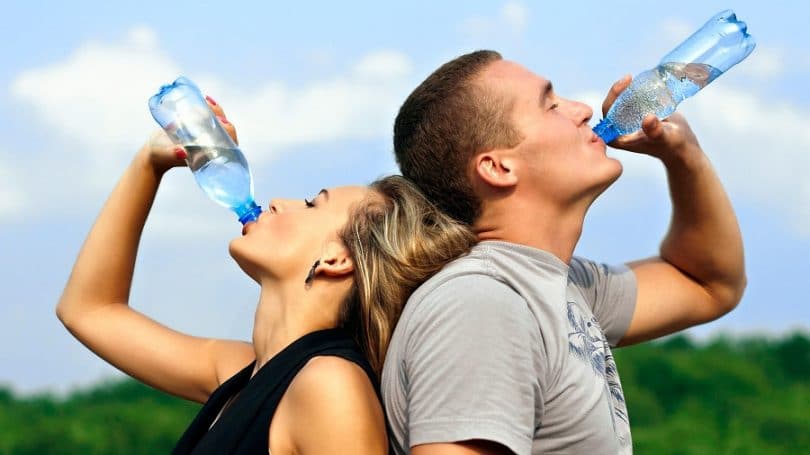
For human beings, water is only next to air in terms of the most critical need. On average, it comprises roughly 57-60% of the human body but this figure can go higher or lower depending on several factors. Water has numerous functions as a vital part of human function.
It aids in the transportation of nutrients and digestion of food, regulates body temperature and helps achieve pH balance. It is used in all of the human body’s regular, systemic functions.
Take water away and the human internal systems will collapse; you can actually see this in victims of dehydration. At its onset, dehydration manifests itself in increased thirst, lower urine output, dizziness, dry mouth, weakness, palpitations, muscle cramps, sluggishness, inability to sweat, and confusion.
In more extreme cases, lack of water over extended periods causes damage to kidneys, loss of consciousness and even death.
Why Is Food Important?
Nourishment is also a key component of proper human body functions. Humans consume food to develop, repair and replace cell tissue. Energy, temperature regulation, and movement are also contingent on the consumption of food.
Though there are differences on ideal food balance depending on weight, health condition, and age, it is generally accepted that a moderated consumption of food is ideal for a balanced diet.
Good health is contingent on a balanced diet which can be characterized by the presence of carbohydrates, protein, milk & dairy, fruits, and vegetables, as well as fats and sugars. When there is an imbalance, an excess or lack of any of these food types, it opens up the possibility of disorders.

The list of potential ailments which are attributed to an unbalanced food intake is too long to mention. Needless to say, the inability to eat anything will put a strain on health and can cause potentially life-threatening circumstances.
Extended lack of food leads to a drop in blood pressure, and with it a weakening of cognitive function. The brain tends to shove back socially constructed norms such as morals in order to prioritize survival.
The body consumes sugars and stored carbohydrates and later on, starts to consume fats. When the situation is desperate, the organism will consume proteins leading to muscle atrophy. Without the necessary energy source, organs will slowly shut down and eventually, unless prevented, death ensues.
How Long Can You Survive without Either?
All of that being said, both water and food are critical for survival. If you do a brief skim on medical resources, life expectancy without water is shortened to three days. Lack of food is supposed to lead to death in two weeks. Those numbers, however, are oversimplifications as internal and external conditions have an effect as to the lengths of time that a human can survive.
In 2006, Japanese public servant, Mitsusaka Uchikoshi managed to survive 24 days in the cold wilderness of Japan without food or water. He supposedly slipped off a rock, broke his pelvis and was knocked unconscious.
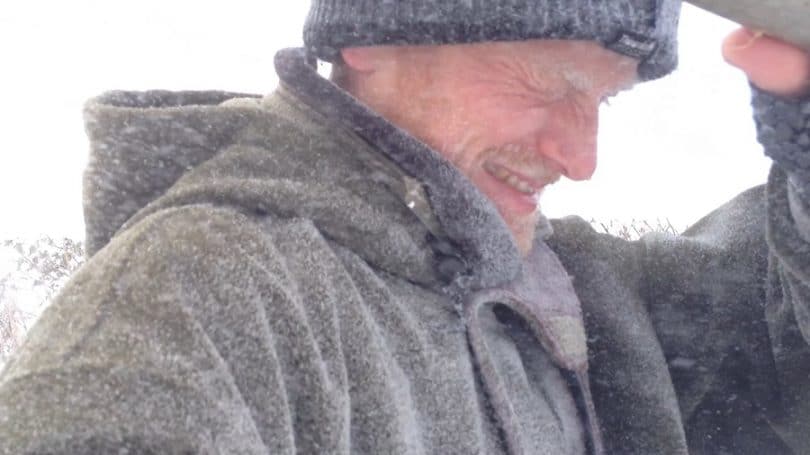
On his 24th day, he was found by a passing hiker who noted that his body temperature was very low and he had a barely discernible pulse. Doctors found that he was on the verge of multiple organ failures. They posit that his brain pushed him into a state of hibernation which set his body to a bare-minimum level of function for survival.
Uchikoshi’s story isn’t a completely unique one, as multiple figures have managed to break past the generally accepted limits of human endurance.
- Mohandas Gandhi, not a spry man by the time he spent 21 days without food in non-violent resistance against British rule. He lived on sips of water alone.
- Andreas Mihavecz was left by authorities in a holding cell for 18 days without sustenance or water. This record is actually recognized by the Guinness World Records. However, it is said that he survived by licking condensation off the prison’s walls.
- David Blaine, the illusionist supposedly survived without food for 44 days while suspended in a glass box.
Some stories are far more outlandish than the ones listed above. But this sort of sets the tone. There are many factors that determine survivability and these aren’t set in stone. Primarily because nobody wants to play human guinea pig and purposefully not eat or take water, and laws would generally stop anyone trying to attempt this.
Factors to Survivability
There are numerous factors that can weigh in on whether or not you will survive deprivation of food and water. One is physical activity.
Physical Activity
The more one exerts effort, this person’s body spends more fuel. Fuel being nourishment from food and fluids. Physical exertion requires muscles to work harder, organs such as heart and lungs adjust output to match the effort exerted.
To compensate, the body has to burn fuel. Calories are burned, and water is spent through sweat.
When placed in a hostile environment, left to their own devices, people will have to exert effort to secure valuable food and water.
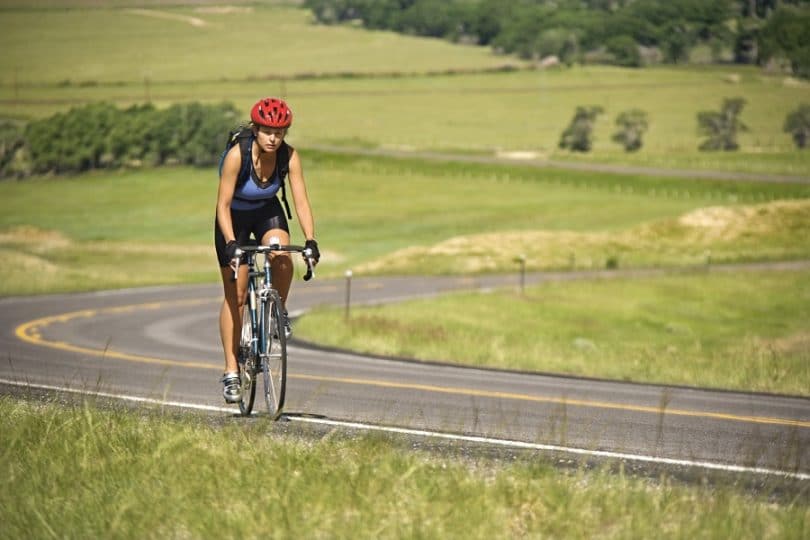
The process of doing this takes a toll as foraging and hunting for food as well as searching for water takes a toll on the body. This is a reason why people who fail to secure sustenance in the wilderness will succumb to dehydration and starvation sooner than a bloke who remained in a less active state.
If we take a look at the examples of people who survived extended periods without nourishment or hydration as listed above, we will notice a general trend. They all were in a generally inactive state. Gandhi during his protest wasn’t out and about.
David Blaine, while suspended in his glass cage remained largely at rest. Mihavecz was trapped inside a prison cell and set the Guinness Record during his incarceration. This is also generally the reason why people who go on hunger strikes, or ritual fasts can last long.
[the_ad_group id=”22″]
When the body is at rest, it is apparently able to go longer periods without nourishment. Uchikoshi’s case was particularly noteworthy in this regard as he has no recollection of his predicament. Medical professionals figured that he went into hibernation, a state of rest that put his body in a survival mode.
It is similar to the way that bears, skunks, bats, snakes and a large number of other creatures hide away during the winter. When these animals hibernate, they cease regular activities and remain dormant without food for months.
They sleep and their bodies revert to a bare minimum required for them to continue life, just long enough to ride out the winter when there is little to no food.
Sleep
The amount of rest apparently factors in as well. How long can you live without sleep?
When in a state of rest, humans process the day’s learning and the brain balances out hormones to allow for a better mood for the following day. Without rest, the brain does not function properly and can lead to a wide variety of ailments.

People who aren’t able to properly rest are more accident prone. Cognition is problematic, and reflexes are slowed.
But what happens to the body when we sleep? During this period, muscles undergo repair from the functions during the day and energy levels are restored.
The longest recorded experiment ended in 11 days when high school student, Alex Boese succumbed to hallucinations, bouts of paranoia and sight problems. The answer to how long one can go on without sleep is not definite yet. Sleep studies are still quite nascent but it is obvious how minor sleep deprivation affects people.
If placed in a critical setting, sleep also factors in a great deal to survivability. Sharpness and clarity of thought are necessary to ensure survival. The ability to put the body at rest also factors into the idea of lessening the body’s consumption of necessary resources of water and nutrition.
The ability to sleep also brings to mind another factor to the length of time one can survive without food or water.
External Factors
Aside from individual physical realities that beset someone that is deprived of food and water, a consideration that has to be made with regard to his or her survival is the environment. Is it hot? Cold? Humid?
The environment in and of itself can be a cause of death. And this is the case for many people who have wound up stranded in a hostile environment.
See also: Living in The Wilderness: What to Expect, How to Face It
Focusing on the variables of oncoming starvation and dehydration, the climate of a particular location will play a big role on whether someone makes it or not.
In locations with high temperatures the body loses water much faster than otherwise. In these situations, any physical exertion has to be carefully considered. The body needs to utilize more water to stabilize the temperature. Any work done produces more sweat.
As water is lost at a higher rate, a person is brought closer to dehydration much faster. Symptoms of dehydration set in and death become, a very real possibility unless rehydrated. Check out our piece on how to choose the best electrolyte supplement to meet your needs.
In the desert, without water and food, death can take less than 24 hours. A hiker in Death Valley died within 5 hours of being reported missing. An advanced manifestation of dehydration known as heat stroke was the adjudged culprit of his demise.
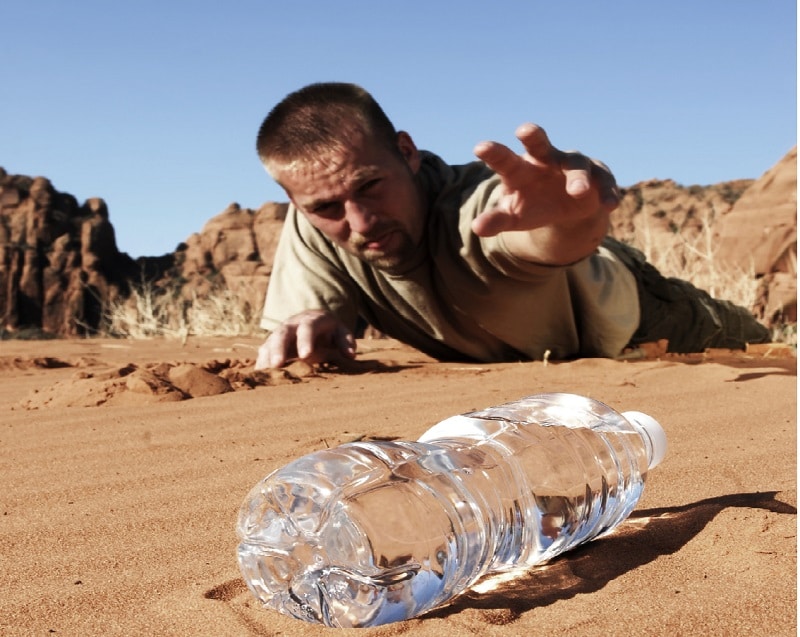
Heat stroke is known to be able to take the lives of otherwise normal beach-goers in high-temperature locations.
On the far opposite, in extreme cold, you would think that someone could last longer without food and water. Well, no, not really. For one thing, you can’t actually eat snow directly. You will need to melt it before consuming.
Otherwise, you increase the risk of dehydration and hypothermia (because you would be lowering your body temperature). The body is equipped with mechanisms to deal with cold, such as shivering, however when coupled with a lack of nourishment, the ability of the body to cope and seek out protection from the cold is decreased.
When exposed for extended periods to excessively low temperature, the body’s temperature slowly drops. When it becomes too low, organs start to fail.
It’s also worth noting that in the cold, the body requires more calories. This is because it exerts more effort to raise body temperature. Lack of food in the body makes it much less possible to control temperature and survive the situation.
The presence of shelter can greatly increase a person’s survivability in instances when water and food are scarce or not present. Protection from the elements can allow the body to focus on keeping itself alive without having to adjust to external conditions.
Plus shelter can improve chances of sleep, which is essential for survival and is potentially contributory to increasing resistance to dehydration and starvation.
Health Conditions
Aside from what goes on outside, a person’s physical condition also has a bearing on how long he or she can survive without food or water.
First is overall health. Size may well be a consideration. Sufficient fat deposits and muscle tissue, though not the determinant between life and death of hunger, can provide an additional last-ditch energy source for the body allowing it to stave off starvation.

A person of lower weight will not have this additional fuel hence, a potentially lower probability of survival.
A person who is already weak, or sickly faces a much bigger challenge of surviving dehydration and starvation. A healthy person should have properly functioning internal processes and can survive much longer under adverse circumstances.
Assuming that the ability to seek out food or water is possible, a functional physique will be a greater benefit than a weakened one.
Someone who has contracted a condition that affects hydration and hunger such as food-poisoning, amoebiasis, diarrhea and the like will hasten the onset of the effects of dehydration. Already low fluid levels and nutrition levels will be expelled continually from the body. The more fluids are taken from the body, the lower the chances of survival you get.
Mindset and Mental Toughness
A large portion of whether or not someone can survive long periods of hunger or thirst can also have to do with the individual in question. Aside from their individual anatomies, the ability to survive hunger and dehydration may come with discipline and mental toughness.
Monks and religious peoples from varying walks of life and sectarian origins have managed to regularly fight hunger in their fasts. Though one can argue that these are usually in shorter timeframes, many tales pervade the ability of ascetics to ward off hunger for extended periods.

A number of people who have taken on purposefully facing starvation have also been associated with political causes.
Figures such as Gandhi, Irom Sharmila and those that took part in the Irish Hunger Strike have faced hunger over extended periods with a strong dedication to a clear purpose. That being said the fulfillment of their goals was largely hinged on their ability to take on hunger.
One other possible angle is called “will to live”. This is believed to be a driving force that has allowed many already on death’s doorstep to continue living.
[the_ad_group id=”23″]
Some researchers have found that individuals facing life-or-death situations with a strong attachment to life, in the form of hope or aspiration tended to be able to overcome their circumstances.
This hypothesis, however, cannot be fully tested given the fact that most people on hunger strike aren’t too keen on being studied. Also on the will to live, those that have died cannot be revalidated, and those that managed to overcome death one time usually aren’t intending to repeat the experience.
Overcoming starvation and dehydration is definitely a huge task. The amount of time, one can survive in conditions when deprived of food and water will vary based on many conditions. Some variables may be easily identifiable while others, not so much but to be straight about it, there is no exact time limit.
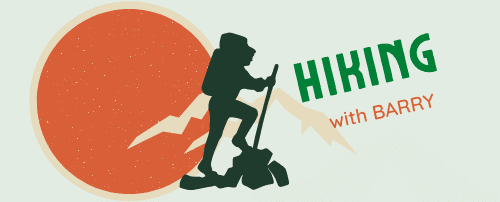

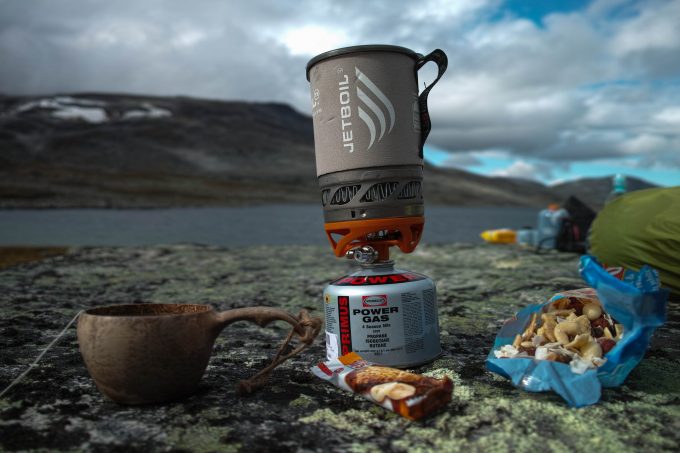
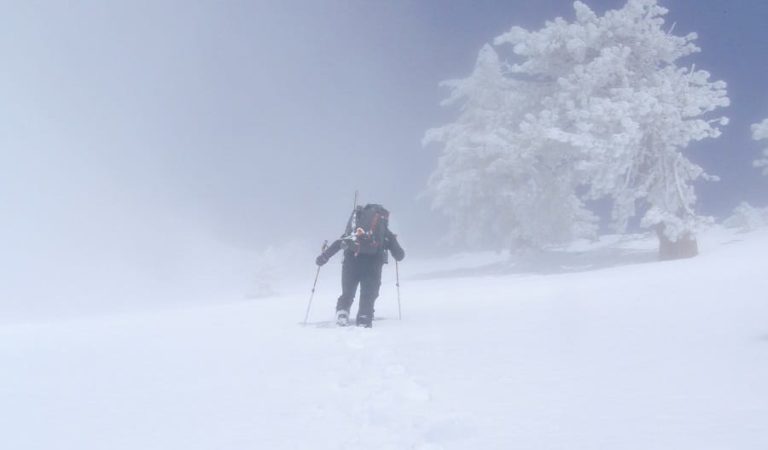
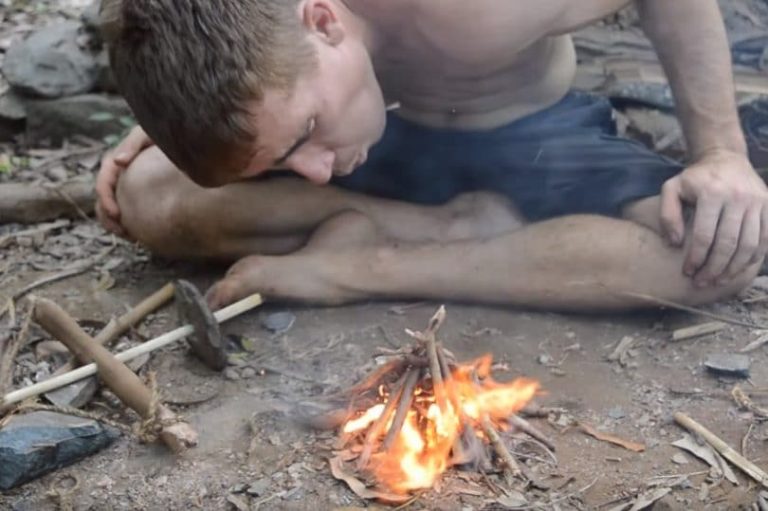
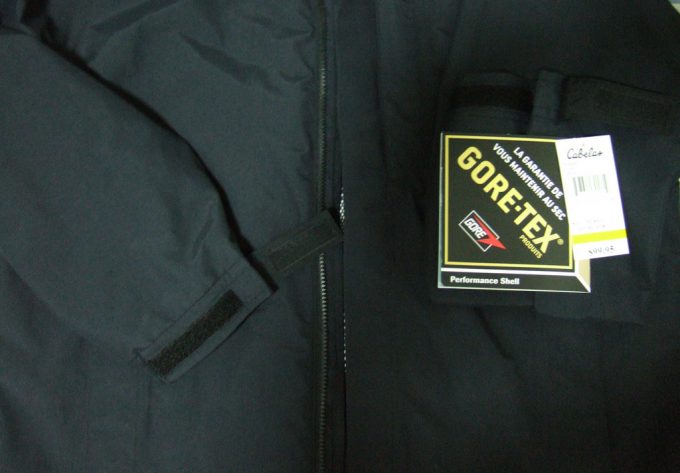
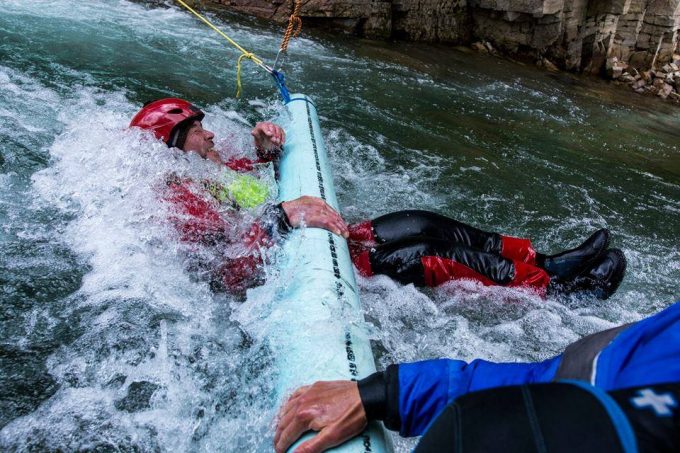
I wanted to take a moment to offer up my thoughts on the common misconception that you need more water in warmer temperatures than you do in cold.
I believe this to be untrue. You need the same amount in both conditions, perhaps even more in the cold. The air in your lungs contains moisture, in warm weather the air around you is also moist (in most climates, this is not typical of all), so when breathing out, you’re not losing a great deal of moisture, as it is naturally replaced by the air you are breathing in. In colder weather, however, you are breathing in air that is much drier, which is then moistened in the lungs, before you once again breathe out. Therefore, the amount of water you lose through breathing is greater in colder weather.
What’s more, in colder temperatures, you require more calories and in order to digest those calories, your digestive system uses water, thus increasing the amount of water your body requires.
This is actually true. During cold weather, even if you don’t sweat as evident as you’ll be during warmer hikes, your body works double time to warm you up and will let you lose fluids from breathing and pumped up metabolism.
I wanted to take a moment to offer up my thoughts on the common misconception that you need more water in warmer temperatures than you do in cold.
I believe this to be untrue. You need the same amount in both conditions, perhaps even more in the cold. The air in your lungs contains moisture, in warm weather the air around you is also moist (in most climates, this is not typical of all), so when breathing out, you’re not losing a great deal of moisture, as it is naturally replaced by the air you are breathing in. In colder weather, however, you are breathing in air that is much drier, which is then moistened in the lungs, before you once again breathe out. Therefore, the amount of water you lose through breathing is greater in colder weather.
What’s more, in colder temperatures, you require more calories and in order to digest those calories, your digestive system uses water, thus increasing the amount of water your body requires.
This is actually true. During cold weather, even if you don’t sweat as evident as you’ll be during warmer hikes, your body works double time to warm you up and will let you lose fluids from breathing and pumped up metabolism.
Though there are certainly exceptions to these rules, I think anyone who finds themselves in a survival situation, should bear them in mind.
The rule of three highlights the four main requirements for human survival:
1. Humans can’t survive more than three minutes without oxygen.
2. Humans can’t survive more than three hours without shelter (this refers to extreme temperatures (e.g. below zero, at which point hypothermia will begin to set in).
3. Humans cant survive more than three days without water.
4. Humans cant survive more than three weeks without food.
Again, there are exceptions, for instance, Aleix Segura Vendrell from Barcelona, Spain holds the world record for holding breath underwater, he was able to do so for 24 min 3.45 secs on 28 February 2016.
Your current health, the environment and other factors will likely vary the outcome, however, this is a pretty solid rule of thumb that everyone should know.
It is quite safe to say not to defy the odds of being the next record holder because it is not healthy and is extremely dangerous. You can survive for days, but the best tip whenever you’re going outdoors is to stock up on rations and tools that can help you survive.
Though there are certainly exceptions to these rules, I think anyone who finds themselves in a survival situation, should bear them in mind.
The rule of three highlights the four main requirements for human survival:
1. Humans can’t survive more than three minutes without oxygen.
2. Humans can’t survive more than three hours without shelter (this refers to extreme temperatures (e.g. below zero, at which point hypothermia will begin to set in).
3. Humans cant survive more than three days without water.
4. Humans cant survive more than three weeks without food.
Again, there are exceptions, for instance, Aleix Segura Vendrell from Barcelona, Spain holds the world record for holding breath underwater, he was able to do so for 24 min 3.45 secs on 28 February 2016.
Your current health, the environment and other factors will likely vary the outcome, however, this is a pretty solid rule of thumb that everyone should know.
It is quite safe to say not to defy the odds of being the next record holder because it is not healthy and is extremely dangerous. You can survive for days, but the best tip whenever you’re going outdoors is to stock up on rations and tools that can help you survive.